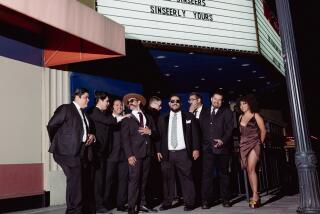POP MUSIC REVIEW : Ain’t Nothing Phony About Sonnier’s Cajun Style
- Share via
SANTA ANA — Far more often than not, when an artist tries to bring a unique indigenous culture into the mainstream, that culture gets diluted or distorted beyond appreciation. Certainly Louisiana’s Cajun culture has endured its share of bastardizations, with some accordion-ized efforts sounding like the musical equivalent of assembly-line Cajun potato chips.
But in a splendid performance at Hamptons on Wednesday night, Jo-El Sonnier sank his Cajun roots into a number of musical territories, and made them all seem like home.
A scant five years ago, Sonnier was known mainly as a musician’s musician, which is a polite way of saying most people didn’t know him from Superman’s dad. On the pudgy side then, and sporting a Ringo haircut, he chiefly played traditional Cajun tunes on his diatonic button accordion. And even though his bands often included the likes of Garth Hudson, Albert Lee and David Lindley, his shows remained cloistered affairs.
Today the slimmed-down, hair-slicked musician has a whole set of sharp stage moves, and a similarly revamped repertoire that has made him no stranger to the country Top 5. But, as evidenced Wednesday, he remains a passionate singer and a blindingly good accordionist, and nearly every song he touched in a varied 26-song set was enriched by his bayou background.
Sonnier and his four-piece band, the Instigators, opened with Hank Williams’ “Jambalaya,” giving it a slow, shimmering intro before kicking into a wild locomotive rhythm. Throughout the show his band worked with tight precision, with guitarist John Jackson being both the group’s standout musician, thanks to inventive blues-based lines, and its occasional annoyance, when his high-volume fills at times trod over Sonnier’s vocals.
The set showed Sonnier’s excellent ear for songs: He has given a second chance to undeservedly under-recognized tunes by Richard Thompson, Randy Newman, Dave Alvin, John Hiatt and others. His version of Alvin’s song “So Long Baby Goodbye” rode like a hayride on fire, while a cover of Robert Cray Band writer Dennis Walker’s “I’ve Slipped Her Mind” held a taut drama.
Hiatt’s “Have a Little Faith in Me,” the title tune on Sonnier’s current album, was the only song in the show to come up short. Hindered by an MOR-ballad arrangement, Sonnier’s halfhearted vocal made no inroads on Hiatt’s definitively emotive version.
Sonnier more than made up for that lapse on Newman’s beautiful “Louisiana 1929.” His vocal, full of that traditional Cajun plaint, gave an added firsthand character to Newman’s account of a disastrous Louisiana flood. On the unaccompanied intro and end of the song, his haunting accordion interpretation of Newman’s stately theme sounded like it was slowly wafting over a moonlit lake.
There was a swampy menace mixed in with the feel of Elvis’ early RCA sides on “The Hurt in My Heart,” while versions of the insanely upbeat “Louisiana Blues” and Slim Harpo’s “Rainin’ in My Heart” were unquestionably from Dixie Beer territory. But even Sonnier’s more pop-oriented attempts, such as the current single “Scene of the Crime” and the ballad “No More One More Time” had a Cajun earthiness to them.
Sonnier saved his best for last, though. From Britisher Richard Thompson’s Cajun-influenced “Tear-Stained Letter” through the pure Acadiana of the encore numbers “Evangeline Special” and “Chere Alice” and the zydeco boogie “Sugarbee,” Sonnier shook his accordion as if it was a wolverine he was trying to get free of.
Now 44, Sonnier cut his first Cajun record when he was 13. Though he now abandons his traditional button accordion on some of his more pop-based songs, he has few peers on the instrument, as his impossibly fast, ovation-drawing finger-work on “Sugarbee” demonstrated. And, as seems the case with all the best Cajun music, “Evangeline Special” and “Chere Alice” were brimming over with both sadness and celebration.
Like the recent successes of Bonnie Raitt and Aaron Neville, Sonnier’s music is cause for hope that music born of people, places, feelings and experiences can still find a place on the charts.
More to Read
The biggest entertainment stories
Get our big stories about Hollywood, film, television, music, arts, culture and more right in your inbox as soon as they publish.
You may occasionally receive promotional content from the Los Angeles Times.










